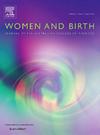Beyond bereavement: Women’s healthcare experiences and cardiovascular disease risk in the years after stillbirth and recurrent early pregnancy loss
IF 4.4
2区 医学
Q1 NURSING
引用次数: 0
Abstract
Problem
Cardiovascular disease (CVD) is the leading cause of death among women.
Background
Adverse pregnancy outcomes, such as stillbirth and recurrent pregnancy loss, are sex-specific risk factors for CVD. Little research investigates CVD preventive healthcare following bereavement.
Aim
To describe women’s preferences and experiences regarding CVD preventive healthcare after bereavement and identify their questions to inform future research and intervention design.
Methods
A participatory, qualitative approach was adopted, involving a Lived Experience Expert Group to plan, conduct and interpret focus groups with women who experienced stillbirth or recurrent pregnancy loss. Focus groups involved facilitated group discussion, and a nominal group technique activity to prioritise questions about CVD risk. Focus group transcripts were analysed thematically.
Findings
Sixteen women participated, all previously unaware of the association between their bereavement and increased CVD risk. Two major themes emerged: women have unmet needs for supportive care after bereavement, and a cautious desire for information about CVD risk. The ‘top ten’ questions focussed on improving bereavement care, preventing CVD, and concerns beyond CVD.
Discussion
Although women valued information about CVD risk, they were concerned about adding to the burden of bereaved women, especially in the context of inadequate bereavement care.
Conclusion
Gaps in bereavement care have an enduring impact on women after early pregnancy loss and stillbirth. Beyond improving women’s experiences and mental health outcomes, improving bereavement care may also support uptake of long-term CVD preventive healthcare.
超越丧亲之痛:死产和反复早孕流产后数年妇女的保健经历和心血管疾病风险
问题心血管疾病(CVD)是女性死亡的主要原因。不良妊娠结局,如死产和复发性流产,是CVD的性别特异性危险因素。很少有研究调查丧亲之后的心血管疾病预防保健。目的描述女性在丧亲后对心血管疾病预防保健的偏好和经历,并确定她们的问题,为未来的研究和干预设计提供信息。方法采用参与式定性方法,由生活经验专家组计划、指导和解释死胎或复发性流产妇女的焦点小组。焦点小组参与促进了小组讨论,并进行了名义上的小组技术活动,以优先考虑有关心血管疾病风险的问题。按主题分析焦点小组记录。16名女性参与了这项研究,她们之前都没有意识到丧亲之痛与心血管疾病风险增加之间的联系。出现了两个主要主题:妇女在丧亲后对支持性护理的需求未得到满足,以及对心血管疾病风险信息的谨慎渴望。“十大”问题集中在改善丧亲护理、预防心血管疾病以及心血管疾病以外的问题。尽管妇女重视有关心血管疾病风险的信息,但她们担心会增加丧亲妇女的负担,特别是在丧亲护理不足的情况下。结论丧亲护理对早期流产和死产妇女有持久的影响。除了改善妇女的经历和心理健康结果,改善丧亲护理也可能支持长期心血管疾病预防保健的吸收。
本文章由计算机程序翻译,如有差异,请以英文原文为准。
求助全文
约1分钟内获得全文
求助全文
来源期刊

Women and Birth
NURSING-OBSTETRICS & GYNECOLOGY
CiteScore
7.20
自引率
13.20%
发文量
371
审稿时长
27 days
期刊介绍:
Women and Birth is the official journal of the Australian College of Midwives (ACM). It is a midwifery journal that publishes on all matters that affect women and birth, from pre-conceptual counselling, through pregnancy, birth, and the first six weeks postnatal. All papers accepted will draw from and contribute to the relevant contemporary research, policy and/or theoretical literature. We seek research papers, quality assurances papers (with ethical approval) discussion papers, clinical practice papers, case studies and original literature reviews.
Our women-centred focus is inclusive of the family, fetus and newborn, both well and sick, and covers both healthy and complex pregnancies and births. The journal seeks papers that take a woman-centred focus on maternity services, epidemiology, primary health care, reproductive psycho/physiology, midwifery practice, theory, research, education, management and leadership. We also seek relevant papers on maternal mental health and neonatal well-being, natural and complementary therapies, local, national and international policy, management, politics, economics and societal and cultural issues as they affect childbearing women and their families. Topics may include, where appropriate, neonatal care, child and family health, women’s health, related to pregnancy, birth and the postpartum, including lactation. Interprofessional papers relevant to midwifery are welcome. Articles are double blind peer-reviewed, primarily by experts in the field of the submitted work.
 求助内容:
求助内容: 应助结果提醒方式:
应助结果提醒方式:


